- Home
- Alex Archer
Solomon's Jar Page 6
Solomon's Jar Read online
Page 6
Points for a diplomatic way of calling me young, she thought, given his own age. She smiled a middle-candlepower smile at him—it never hurt to keep things cordial, without lighting any fires she might need an extinguisher to put out later—and entered a white sitting room. Or what she suspected might be a sitting room.
It had chairs and tables, in any event. A low fire crackled in a white marble fireplace. Something else practically screamed for her attention. She fixed it upon the young man’s sleek, smiling visage.
“Sir Martin will see you shortly,” her escort said, and went through the next door, which he quietly but firmly closed behind him.
She took stock of her surroundings. The room fell just short of sterile. It was painted and decorated in a variety of shades: off-white, ivory, cream, bone. The chairs were upholstered in a leather that was almost pale beige. Some touches of color decorated the room, largely hues of gold, including the ormolu clock on the mantel, the frame of a large painting and the painting itself, depicting a pure white tree standing amid a green sun-shot forest.
There was one more touch of yellow metal. It was the thing that had caught her attention on entering the room. A plain container of shiny brass, like a globe with a tall narrow funnel stuck in the top and curling thin handles, perhaps a foot high.
A jar.
It looked like an antique Mediterranean jar might look, dredged from the sea bottom, if the sea-salt deposits and verdigris were cleaned off. It was a procedure no responsible archaeologist could condone, for risk of damaging the artifact. But a collector might not be so scrupulous. Nor might someone with other than strictly scientific ends in mind.
She took it from the mantel to examine it. If cleaning it didn’t hurt it, picking it up won’t do much, she thought—except leave fingerprints she could readily wipe away. Provided it’s even an ancient artifact in the first place.
It felt surprisingly heavy in her hand. She was far from expert on biblical-era artifacts. But within her limited scope of knowledge she could discern no reason it might not have dated from Old Testament times. The wide mouth was open.
It was, she saw, inscribed with symbols. The marks were thin, shallow, spidery; invisible from a few feet away. The symbols were unfamiliar to her: lines, curved, straight and angled; circles; odd compound geometric shapes.
Something about the vessel felt strange. Then she realized the strangeness wasn’t a result of something the jar possessed, but what it lacked.
If King Solomon had had a jar, and had once bound demons in it, this was not that jar. She felt certain such a use would leave it charged in a way that even after millennia its very touch would send a thrill like electricity through her body. This object was inert as a hammer.
She turned it over. The lower curve was curiously dented. In the indentation she thought she could see small flecks of dried brownish residue. She smelled a faint, cloying stench.
Then once more she felt a chill, and seemed to smell an opened grave.
A footfall from outside the door alerted her someone was coming. She quickly replaced the jar and turned.
Reginald Smythe-George opened the door, entered with a quick smile for Annja, and stood aside. A tower-tall and spectrally thin man entered at stately stilting pace behind.
“Sir Martin,” the young factotum said, “may I present Ms. Amy Corbett? Ms. Corbett, Sir Martin Camdessus Highsmith, Adeptus Primus of the White Tree Lodge.”
She stepped forward, extending a hand. Sir Martin took it in a firm, dry grip and shook, once. His hair was white and looked as if each individual strand had been arranged by hand just before he entered. His face was a collection of knobs and flanges that looked almost harsh. He wore an immaculately tailored suit with the same color scheme as the room itself—jacket, trousers, shirt and old-time silk cravat all in shades of white and near-white.
The only discordant element in the whole image was his eyebrows. They were fierce white projections, untamable as flames, above eyes of a blue so pale they were almost a shade of white themselves.
“Pleased to make your acquaintance, Ms. Corbett,” the master of the house said in a baritone voice that might have been toned by a tuning fork. “Please be seated.”
He waited until she sat in one of the lesser chairs, then took what she had rightly guessed was his accustomed place in a cream-colored wingback.
“This is a very beautiful house, Sir Martin,” she said. “Is it your family’s?”
“Thank you. And no, Ms. Corbett. My esteemed ancestors frittered away the family fortune before the Great War—our estates were sold for taxes between the wars. This house is provided to the lodge through arrangement with the National Trust.”
He cocked his head at her. “You are an archaeological researcher, then?” he asked.
She smiled and nodded. “Writing an article for Archaeology Today magazine. On spec, I’m afraid. With, ah, an interest in the history of the Western Hermetic tradition,” she said.
“Indeed? I imagined it was the archaeological heritage of the site that drew you here.”
“To be sure, that adds interest, Sir Martin. As I understand, the manor is built on the site of one of the earliest Anglo-Saxon hill forts and the attached abbey at what is supposed to be the juncture of several ley lines.”
“You’ve done your homework, then,” he said, nodding approvingly. “But what I think you will find most vital—and key to our whole endeavor here—are Neolithic artifacts discovered on the grounds that demonstrate that this site has been recognized as holy throughout the entirety of its human occupation.”
His eyes had begun to shine.
“I’m afraid my primary knowledge is focused on the Middle Ages forward,” she said, “although I was aware of Neolithic and Bronze Age discoveries.”
“Bronze Age,” he said as if mentioning something the dog did on the rug.
She raised an eyebrow at him. “My knowledge is incomplete and purely academic,” she said, “but I thought it was cold iron that conflicted with magic.”
“Iron. Bronze. This to them!” He dismissed all metals with a wave of a long, well-formed hand. “They are pollution in and of themselves.”
“Do they not occur in nature, Sir Martin?”
“Of course. It is when they are plundered from the bosom of the good earth and elaborated in profane ceremonies that they become taints, poisoning the human spirit and poisoning all life.”
“I had understood that Wiccans—”
“We see again that knowledge is not the same as understanding, Ms. Corbett. Therein lies one of the tangled roots of the modern malaise, prizing mere information while understanding nothing, or next to it!”
“I think I agree, Sir Martin, but I’m not sure I see your point,” Annja said.
“If you will forgive my rudeness in contradicting you, you don’t understand our lodge at all if you believe we are part of Wicca. To be sure some of their rituals have merit, and a certain naive power, for all that they were largely created from whole cloth in the nineteenth century.”
“But it was my understanding—forgive me, my impression—that the lodge practiced a traditional Western form of nature worship.”
“That much is certainly true. But that does not make us Wiccans, dear lady.”
He leaned forward, and his passion seemed to glow from his eyes and radiate from his prominent teeth, which were themselves a shade of off-white, she couldn’t help noticing.
“Leave aside the truth or falsity of the ancient worship of the Great Mother and the horned god,” he said. “We subscribe to the true old religion,” Sir Martin proclaimed.
“Don’t the Wiccans make similar claims?” Annja asked.
He dismissed the notion with a wave of his hand. “I mean the religion of the dawn men. From before the druids, before the pyramids, before the great crime of agriculture. Ours is the primal religious ecstasy expressed by the cave painters of Lascaux. Our worship is devoted to the earth’s very self—we do not profane and dim
inish the earth by personalizing it as a mere human. Especially now, when humans have covered much of the beautiful face of the planet with their concrete canker sores, and the waters with their muck and ooze.”
He sat upright again with a half-rueful smile. “You must forgive my vehemence,” he said.
“You certainly have the courage of your convictions, Sir Martin.”
“Thank you, my dear. You are most kind.”
“So the lodge believes that our modern technological civilization is a mistake?” she asked.
“A desecration,” he said.
Then his near white eyes slid past her. She turned her head but slightly. Far enough for her peripheral vision to register the direction of his gaze. He was looking straight at the brass jar on the mantel.
He knows, she realized. Might as well be hanged for a sheep as for a lamb, she thought. She drew in a deep breath. Then she plunged in head first.
“Given your institute’s focus on prehistoric native beliefs,” she said, “I admit I find its interest in a relic such as the alleged jar in which King Solomon bound the demons to be quite curious.”
He looked directly at her for a moment. It seemed that his expression hardened, and that his eyes went from silver to steel.
“So,” he said—softly, as to himself. “The margin of error is small, so small, in this terrible modern world of ours. As you observed, Ms. Corbett, I am passionate in my convictions. Sometimes my passions overwhelm me. Especially when my dearest expectations are raised, only to be cruelly dashed.”
He stood. “As to my interest—our interest—the earth’s interest in the jar of Solomon, it would be pure waste to tell you now. No point, really.”
Either his disdain for modern technology did not forbid him from carrying some kind of wireless communicator hidden on his person, or he possessed strong psychic powers. Annja did not discount the latter possibility as readily as she might have a year earlier. The door opened suddenly and two men, dressed in rough, soil-stained workman’s garb that seemed itself to belong to an earlier century, stepped in.
“Mal, Dave,” Sir Martin said. One newcomer was short and broad, with dark hair on his balding head and sticking from his prominent ears. The other was a huge, near shapeless mound of muscle. He was an albino with skin as chalky as the famous cliffs nearby and hair whiter than anything else in the white room. Both wore silver lodge medallions. The squat dark man carried a double-barreled shotgun under one arm.
“My Purdey, Dave?” Sir Martin inquired.
The squat man shrugged. “It’ll do the job, won’t it, Squire?”
“Ms. Corbett is leaving us,” Sir Martin said. “Permanently, I fear. Reginald, I fear we need to clean up after my…indiscretions. See to it, won’t you, there’s a good lad?”
“Of course, Sir Martin,” Reginald said coolly.
“Please take our guest into the back garden, kill her and bury her in the churchyard where none will be the wiser. And for nature’s sake, do it quietly!”
THE HUGE ALBINO, Mal, picked up a shovel leaned against the moss-grown stone wall as they passed beneath a gateway arch at the back of the great white house. Annja didn’t know whether it was intended to kill her or inter her. Probably both she guessed. The White Tree Lodge did not seem to disdain modern concepts of efficiency. She wondered, idly, how they justified their reliance on the techniques and technologies they so despised.
The derelict abbey reared to the right. Ivy practically encrusted the limestone walls, which had fallen in at the top. A passageway led between rosebushes just beginning to bud with spring. Beyond lay another arched gateway. Through it the granite-and-limestone headstones of the churchyard were visible, jumbled gray-and-white shapes in the thickening twilight.
“We really don’t have to play it this way, gentlemen,” Annja said when there were walls all around. Flying things fluttered about, shadows tracing oddly irregular paths, bats or swallows she could not tell. The sun no longer shone here this day. It felt as if it never had.
“Coo,” said the short, squat Dave. “I fancy hearing what the bird has to offer. What about you, Mal?”
The albino grunted.
“Not a bit of it, lads,” Reginald Smythe-George called out, coming along seven yards or so behind as if pulling rear guard. Maybe he didn’t want to risk getting his expensive trousers splattered, Annja thought. “This is lodge business. No time for frivolity,” he said.
“What’s the point of belonging to a fertility cult,” Dave groused, “if you can’t enjoy a few rites o’ fertility—if you know what I mean?”
Mal smiled.
“So this is the way it has to be?” Annja asked. She walked toward the churchyard with head down and shoulders slumped.
“That’s right,” Dave said, “and a damned dirty shame it is. But there it is. Just take it easy, now, and it’ll go easy, if you know what I mean.”
“Sure,” she said, and spun.
Mal’s bulk and slow, shambling motion conspired to suggest slow-wittedness. But there was nothing slow about his response. No sooner had Annja begun to turn than he raised the shovel in both hands. Even as she came around to face him the blade descended to split her head.
But her right hand was no longer empty. She hacked across her body right to left with the sword. She felt two moments of resistance.
Blood hosed her from the stumps of two thick, severed arms.
Mal’s mouth opened and closed. His tongue looked red as blood in contrast to his colorless face. Or perhaps he had bitten it in shock. He made gobbling sounds, quick and bubbling with desperation as he stared at his massive wounds.
“Bloody hell!” Dave exclaimed. He brought up the Purdey.
Annja was on him. A backhand slash severed both barrels of the priceless double shotgun with a belling sound. Reflex made the man yank the now-sawn-off shotgun skyward. Reflex clenched his finger on both triggers. The barrels gouted pumpkin-sized flames into the dove-gray evening air.
Dave roared in surprise and pain as the unexpected recoil broke his trigger finger and possibly his wrist. He had not been gripping the gun properly when Annja amputated two-thirds of its barrel. The giant muzzle flames blossoming so close to his face had ignited the front of his curly hair.
His cry was cut short as Annja took the sword in both hands and raced past him to his right, swinging horizontally as she passed him.
He froze. Blood gushed from his mouth and jetted from his chest. He fell to flagstones half-buried in the turf.
A flash snapped her eyes forward. Simultaneously Annja heard a pop, not particularly loud. Then another. Something plucked like fingers at a lock of her dark hair hanging by her left cheek.
Young Reginald Smythe-George had a tiny black pistol in his hand and was shooting at her from twenty feet away.
Her instructors had always told her to run away from a knife but charge a gun. Of course, they might not have been so cautious about the knives had they known she had a very large knife indeed, carried in the otherwhere where an act of will could bring it to her hand at need. But the advice for firearms remained sound. Fast as she was, she couldn’t outrun bullets. Nor even appreciably dodge them.
She could try to dazzle the shooter with footwork, throw off his aim—which was lousy anyway—and perhaps even startle him too much to shoot. She ran two light steps toward him and threw herself into a cartwheel, neat as a high-school cheerleader.
She heard no shots, felt no slap or sting of impact. Her hair flying loose about her shoulders, she landed on her feet and flowed instantly into a lunge.
The sword entered Reginald’s chest right between the wings of his natty coat.
For a moment they posed there, eyes locked on eyes. Smythe-George’s were very surprised. He tried to say something, but it came out as a large slurp of blood that ran down his chin and made his wine-colored necktie darker. Then his eyes rolled back and he slumped over as life left him.
Annja turned her hips away as his knees gave way beneath h
im, pulling the blade from his body. Then she flicked her wrist, clearing the mystical blade and dewing the broad leaves of the ivy on the passage wall with blood.
“You gave me no choice,” she said.
With a push of her will she put the sword away. She looked around. The western sky looked as if the blood she’d shed had stained it. The manor showed no light nor sign of life. If anyone had witnessed her reversal of circumstance, they were keeping mum about it.
Gathering herself, she climbed to the top of the six-foot side wall. Then she dropped down to the lawn outside. She hoped to have cycled most of the way back to the bike shop before Sir Martin thought to miss his lackeys.
7
Roux pushed his sunglasses halfway down his nose to look at Annja as she walked toward him along the Riviera beach. She wore a green tube top with a hint of blue, shorts in an explosion of colors, red, yellow, blue, white. With her lithe shape and panther poise, she could. Silver-framed sunglasses hid her eyes behind dark lenses. Her hair blew free in the brisk Mediterranean morning breeze.
“You certainly took your time,” the old man said querulously.
He had a metal-and-yellow-plastic-mesh chaise longue unfolded on the sand beneath a green-and-white parasol. He wore a Panama hat with a red-and-black band, a bush jacket, Bermuda shorts and sandals. He sipped a tall iced drink through a straw.
Annja sat next to him on a towel he had spread out beside him in anticipation of her arrival. She drew her long legs up under her chin, and gazed out to sea, where the surreally long low shape of a supertanker made its way west toward the Straits of Gibraltar.
“I thought I was here on time.”
“I don’t mean today, girl. I mean, what in the name of merciful God took you so long to think to come and visit me? You’ve left half of Europe in an uproar in your wake. You’re more like a hurricane than a force of good.”
A pair of adolescent girls emerged from the surf wearing nothing but bikini bottoms. They ran past, giggling in the self-consciousness of their scandalous near nudity. Annja shook her head.

 Rogue Angel: Forbidden City
Rogue Angel: Forbidden City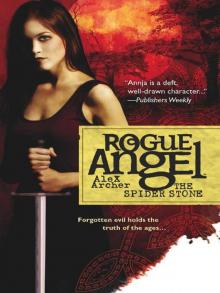 The Spider Stone
The Spider Stone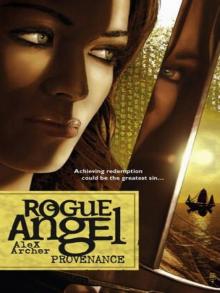 Provenance
Provenance Blood Cursed
Blood Cursed Fury's Goddess
Fury's Goddess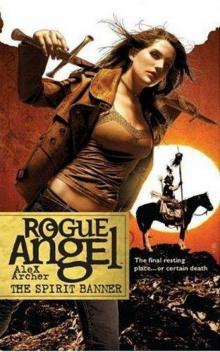 The Spirit Banner
The Spirit Banner Footprints
Footprints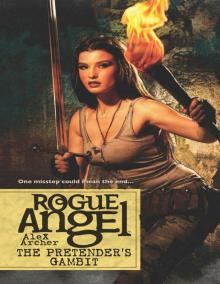 The Pretender's Gambit
The Pretender's Gambit Rogue Angel: The Lost Scrolls
Rogue Angel: The Lost Scrolls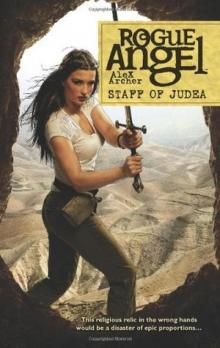 Staff of Judea
Staff of Judea Rogue Angel 55: Beneath Still Waters
Rogue Angel 55: Beneath Still Waters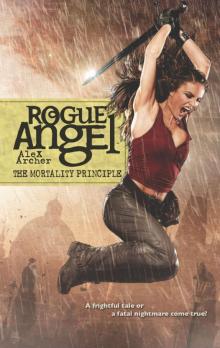 The Mortality Principle
The Mortality Principle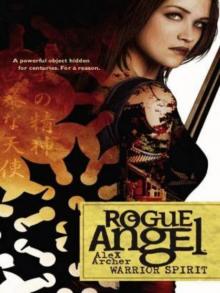 Warrior Spirit
Warrior Spirit Paradox
Paradox Tear of the Gods
Tear of the Gods Forbidden City
Forbidden City River of Nightmares (Rogue Angel)
River of Nightmares (Rogue Angel)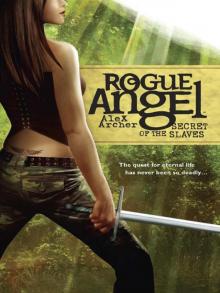 Rogue Angel: The Secret of the Slaves
Rogue Angel: The Secret of the Slaves Destiny
Destiny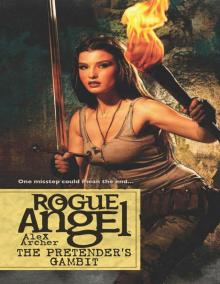 Rogue Angel 51: The Pretender's Gambit
Rogue Angel 51: The Pretender's Gambit Celtic Fire
Celtic Fire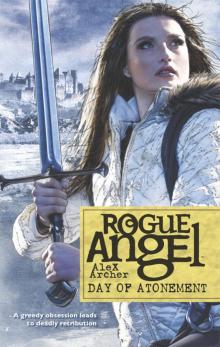 Rogue Angel 54: Day of Atonement
Rogue Angel 54: Day of Atonement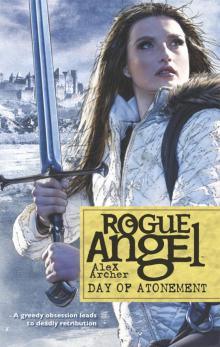 Day of Atonement
Day of Atonement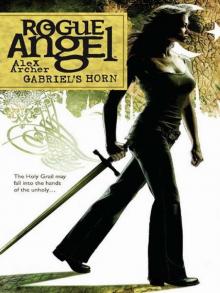 Rogue Angel: Gabriel's Horn
Rogue Angel: Gabriel's Horn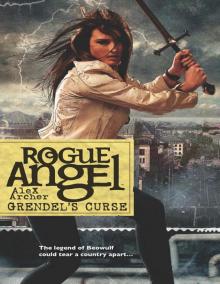 Grendel's Curse
Grendel's Curse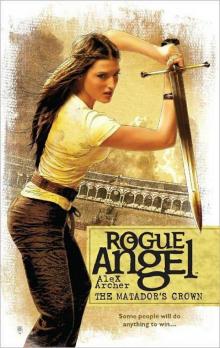 The Matador's Crown
The Matador's Crown Rogue Angel: The Chosen
Rogue Angel: The Chosen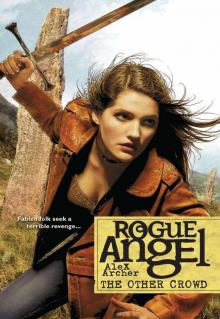 The Other Crowd
The Other Crowd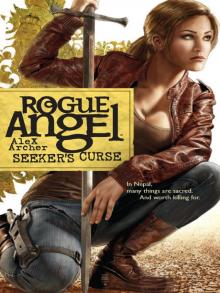 Seeker’s Curse
Seeker’s Curse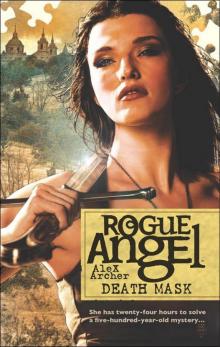 Rogue Angel 52: Death Mask
Rogue Angel 52: Death Mask The Golden Elephant
The Golden Elephant Blood Cursed (Rogue Angel)
Blood Cursed (Rogue Angel) Celtic Fire (Rogue Angel)
Celtic Fire (Rogue Angel)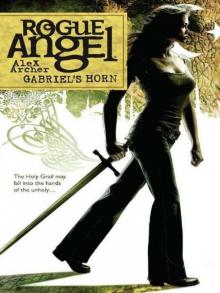 Gabriel's Horn
Gabriel's Horn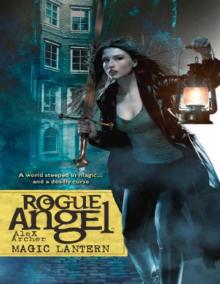 Magic Lantern (Rogue Angel)
Magic Lantern (Rogue Angel) God of Thunder
God of Thunder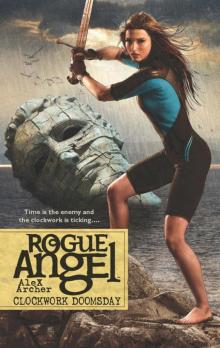 Clockwork Doomsday
Clockwork Doomsday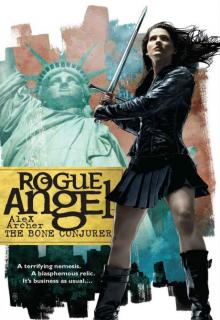 The Bone Conjurer
The Bone Conjurer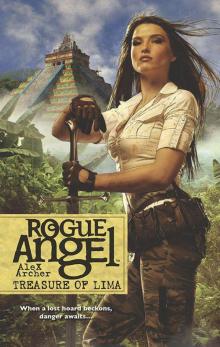 Treasure of Lima
Treasure of Lima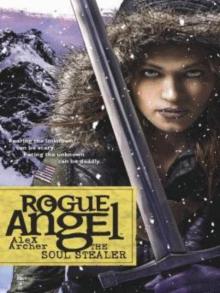 The Soul Stealer
The Soul Stealer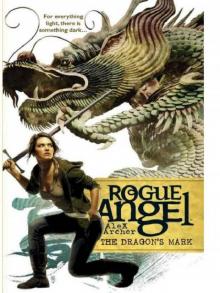 The Dragon’s Mark
The Dragon’s Mark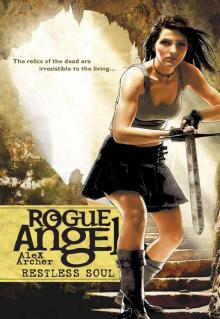 Restless Soul
Restless Soul Rogue Angel: God Of Thunder
Rogue Angel: God Of Thunder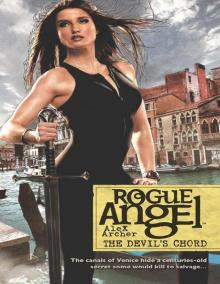 Rogue Angel 49: The Devil's Chord
Rogue Angel 49: The Devil's Chord Death Mask
Death Mask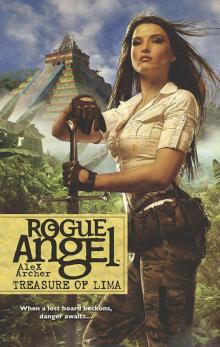 Rogue Angel 46: Treasure of Lima
Rogue Angel 46: Treasure of Lima Swordsman's Legacy
Swordsman's Legacy The Oracle's Message
The Oracle's Message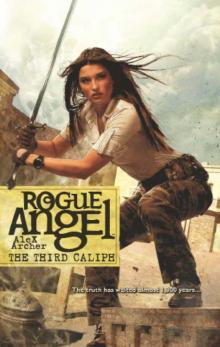 The Third Caliph
The Third Caliph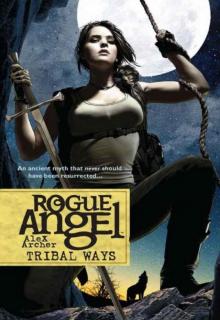 Tribal Ways
Tribal Ways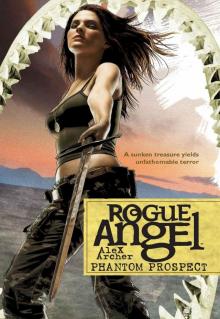 Phantom Prospect
Phantom Prospect Rogue Angel 50: Celtic Fire
Rogue Angel 50: Celtic Fire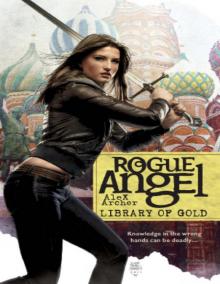 Library of Gold
Library of Gold Rogue Angel 53: Bathed in Blood
Rogue Angel 53: Bathed in Blood Sacred Ground
Sacred Ground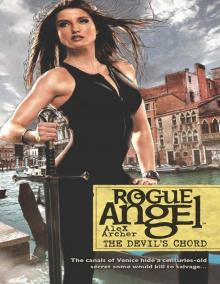 The Devil's Chord
The Devil's Chord Serpent's Kiss
Serpent's Kiss The Vanishing Tribe
The Vanishing Tribe Sunken Pyramid
Sunken Pyramid Sunken Pyramid (Rogue Angel)
Sunken Pyramid (Rogue Angel)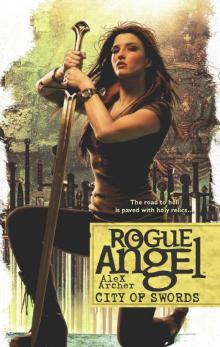 City of Swords
City of Swords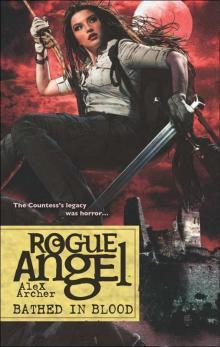 Bathed in Blood
Bathed in Blood The Lost Scrolls
The Lost Scrolls The Babel Codex
The Babel Codex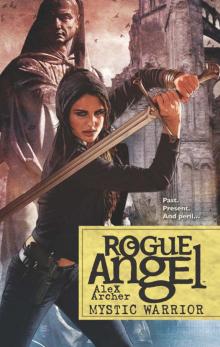 Mystic Warrior
Mystic Warrior Eternal Journey
Eternal Journey Beneath Still Waters
Beneath Still Waters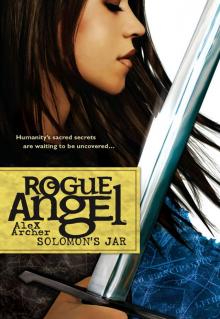 Solomon's Jar
Solomon's Jar Beneath Still Waters (Rogue Angel Book 55)
Beneath Still Waters (Rogue Angel Book 55) Cradle of Solitude
Cradle of Solitude Secret of the Slaves
Secret of the Slaves River of Nightmares
River of Nightmares Polar Quest
Polar Quest False Horizon
False Horizon